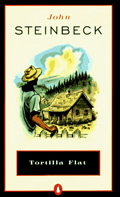
Note: This is #17 in my 52 Classic Movies in 52 Weeks challenge for 2009.
This was kind of an odd one. Sullivan’s Travels is a curious mixture of drama and comedy with the perplexing message of “Don’t try to make movies that honestly explore the human condition; just keep making comedies, you jackass.”
John Sullivan (played by Joel McCray) is a Hollywood director prized by his studio for being able to churn out commercially successful comedies. Sullivan, however, wants to make movies that examine big issues like poverty and class struggles despite the fact that he comes from a privileged background himself. When the studio execs talk him out of it by pointing out that his upbringing means he knows nothing of poverty or having to struggle to survive, Sullivan reluctantly agrees but gets the idea that he should compensate by living the life of a tramp until he feels he has suffered enough to understand poverty.
The studio execs can’t stop him, but plan to trail him to make sure that their hitmaker stays safe (with bumbling and amusing results that are incongruous with the entire spirit of the endeavor). Along the way Sullivan meets a girl (just “The Girl” according to the credits) who had been trying to break in to a Hollywood acting career but has failed and is heading home. The Girl (played by Veronica Lake, who was like SUPER hot I’m not kidding guys) buys Sullivan a meal even though she thinks he’s a tramp. When she learns about Sullivan’s true identity and social experiment, she decides to come along because she’s intrigued and finds Sullivan oddly compelling.
Like I said, the movie is a weird mix of drama and comedy, with slapstick car chases mixed in with almost maudlin moping and stark scenes of soup kitchens and homeless shelters. The acting and cinematography are both fine, if nothing particularly special or spectacular (it’s a pretty straight forward story). And Veronica Lake has great looks and charisma on screen. But all in all I found the whole thing kind of meh; it had a pretty good setup (even if it’s kind of cliche in 2009) but the direction they end up going with it just struck me as odd, especially considering how many great examinations of poverty and the poor followed –or preceded, like The Grapes of Wrath. Yes, comedies have great value to society, but Sullivan’s Travels seemed to go far beyond that and embrace a defeatist message: ignore poverty and social problems –look, here’s a funny cartoon dog! Hee hee!







































